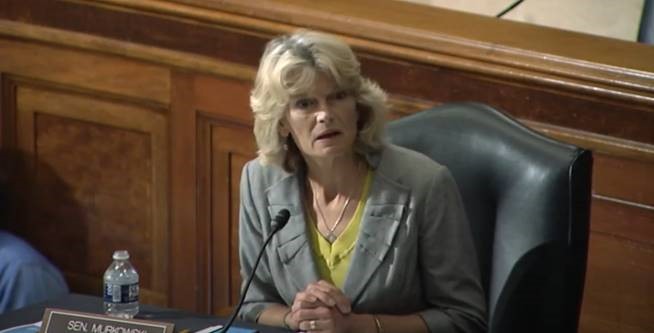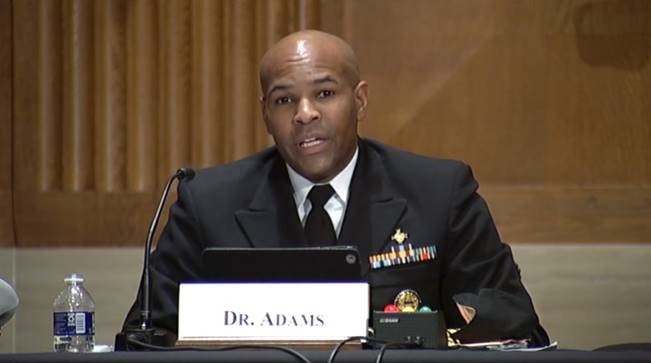Murkowski Joins Senate Hearing On COVID-19 Vaccinations
Discusses Need to Increase Public Confidence for the Sake of Public Health
In light of ongoing efforts to develop a safe and effective vaccine for COVID-19, U.S. Senator Lisa Murkowski (R-AK) took part in a Senate Health, Education, Labor and Pensions Committee hearing entitled, “Vaccines: Saving Lives, Ensuring Confidence, and Protecting Public Health”. At the hearing, witnesses discussed the importance of continuing to receive recommended vaccines during the coronavirus pandemic, including for influenza, as well as the need for ongoing vaccine research and development to prevent outbreaks of infectious diseases, such as COVID-19.
Expert witnesses included: Vice Admiral (VADM) Jerome M. Adams, MD, MPH, Surgeon General of the United States and Dr. Francis Collins, Director at the National Institutes of Health.

Click here for video of Senator Murkowski’s remarks.
Senator Murkowski began her remarks by sharing anxiety over vaccination rates in Alaska, citing recent statistics about pediatric vaccination rates.
“I take particular interest in this discussion about vaccines, because Alaska has lagged historically in terms of our vaccination rate. We have chronically been last among the 50 states. It’s my understanding that we are at about 74.2 percent compared to all the other 50 states. Massachusetts is the highest at around 92 percent. So Alaska has a long way to go, and unfortunately we’ve been this way for a while. So when we talk about vaccine hesitancy in Alaska—we get it. And so I’m very concerned about where we are moving forward with this vaccine,” Senator Murkowski said.
Murkowski also highlighted her concerns over the vulnerable Alaska Native population as well as Alaska’s limited number of healthcare facilities. She noted that Alaska is exactly the type of state that needs to have assurance that the vaccine is going to be safe, and that the approval process has not been subject to political initiatives.

Senator Murkowski went on to share her efforts with colleagues on the Senate HELP committee – including Senators Braun and Hassan—in introducing the Safe Authorizations or Vaccines During Emergencies (SAVE) Act, which aims to improve public confidence in a potential COVID-19 vaccine by ensuring transparent, independent, expert review remains a component of the vaccine approval process. She ended her remarks by asking Dr. Collins and U.S. Surgeon General Adams to help her understand what more needs to be done to build credibility and trust in any future vaccine.
“I would just ask you to help me and encourage Alaskans and other Americans on how we build trust for a vaccine,” said Senator Murkowski. “We are in a tough spot right now. Give me some level of assurance, please.”
Dr. Collins explained that he was aware and sympathetic with Alaska’s particular circumstances. He emphasized that the development of this vaccine, and the effort to gain public trust, must be an all-hands on deck effort.
U.S. Surgeon General Adams added that there should be an effort to ramp up local support for the vaccine through targeted messaging from the sources that each community trusts the most. He also highlighted the importance of helping Americans understand the process of developing a vaccine, particularly the integrity of that process.
BACKGROUND:
- On June 30, Senator Murkowski took part in a Senate HELP Committee hearing focused on how to safely return to work and back to school. The hearing featured Dr. Anthony Fauci, FDA Commissioner Dr. Stephen Hahn, and CDC Director Dr. Robert Redfield. How the U.S. Department of Health and Human Services has used appropriated funding to date was also a focus during the hearing.
- On May 12, Murkowski joined the Senate HELP Committee for a hearing titled “COVID-19: Safely Getting Back to Work and Back to School.” The hearing focused on how U.S. Department of Health and Human Services agencies are working to help states and communities prepare to reopen in light of the COVID-19 pandemic, including efforts to increase testing, accelerate research, develop treatments and vaccines, and provide public health and safety guidance.
COVID-19 SAFETY NOTICE:
In accordance with the U.S. Senate’s Attending Physician and the U.S. Senate Sergeant at Arms, in consultation with the Department of Health and Human Services and the Center for Disease Control and Prevention, Senate hearings have enacted the following adjustments to help ensure the health and safety of all participants during the COVID-19 pandemic: Members were seated six feet apart to respect social distancing guidelines; Participants were given the option to take part in the hearing by video conference; To maintain social distancing, very limited seating was accommodated; Members wore masks to and from the hearing room, but were allowed to remove masks during the hearing, if they chose to do so, as they were seated 6 feet from other members.








